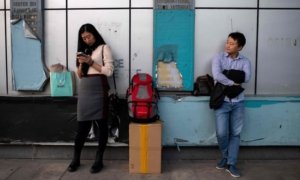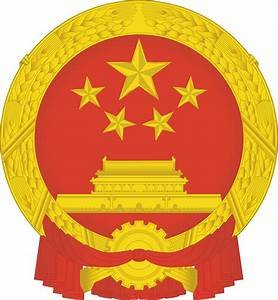Leaders of world’s second-largest economy face some of their most difficult policy decisions in years in 2019
Lily Kuo
Beijing
 To make ends meet, Xu Yuan, 33, has to share a bed with her best friend in Shanghai where she works in marketing. A curtain marks her half of the bed. She stays at work as late as possible every day, going home only to sleep. “Neither of us is happy but we have to be tolerant,” she says.
To make ends meet, Xu Yuan, 33, has to share a bed with her best friend in Shanghai where she works in marketing. A curtain marks her half of the bed. She stays at work as late as possible every day, going home only to sleep. “Neither of us is happy but we have to be tolerant,” she says.
Liu Xun, 26, a video editor in Beijing, does not watch movies in cinemas, buy new clothes, or date. “To be honest, I think having a girlfriend is too expensive,” he says. Hillary Pan, who works in media, says she no longer eats at restaurants and buys a meal from the convenience store 7-11 almost every day.
China’s economy is slowing and it is people like Xu, Liu, and Pan who are feeling the impact. They are among the many regular Chinese who have had to cut back as the world’s second-largest economy experiences its worst downturn since the 2008 global financial crisis.
“People have started to reduce or even stop spending money because they don’t expect the economy will perform well,” said Ye Tan, an independent economist based in Shanghai. “Companies and individuals are wary about the economy.”
Going into 2019, China faces not just a slowing economy but also a protracted trade war with the US, a pile of debt that threatens the world economy along with the Chinese financial system, and a populace demanding better environmental, labour, and health protections.

Next year, China’s leaders face some of the most difficult policy decisions they have had to make in years. Analysts say they are confronting a choice between pushing headline growth through Beijing’s traditional levers of infrastructure spending funded by debt, or painful reforms that lower financial risk but raise the possibility of unemployment, and ultimately social instability.
Officially, China’s economy is humming along. Economic growth is expected to slow to 6.3% next year, after reaching 6.6% in 2018. The economy expanded by 6.5% in the third quarter, the country’s slowest quarter since 2009.
Yet economic indicators from auto sales to manufacturing activity are all flashing red. In November, growth in China’s manufacturing sector stalled for the first time in more than two years. Annual auto sales in the world’s largest car market are on track to contract for the first time since 1990.
Chinese stocks, more a measure of confidence than the real economy, have been some of the worst performing this year, losing $2tn (£1.58tn) in value. Factories have dismissed workers months early for the Chinese New Year holiday in February. Real estate, one of the few areas in which regular Chinese people can invest, has also suffered, causing developers to slash prices.
An economic slowdown is especially sensitive in China, where social stability is often described as contingent on the government’s ability to deliver continued growth. In September, propaganda officials ordered Chinese journalists to refrain from reporting on signs of a slowing economy, the US-China trade war, or anything portraying the “difficulties of people’s lives”.
But those difficulties are hard to contain. As property developers have cut prices to stimulate sales, homeowners in cities across China have staged protests. Worker protests are also widespread. China Labour Bulletin (CLB), which tracks labour activism in the country, found that strikes and protests have spread beyond the manufacturing sector to the service and retail industries between 2013 and 2017, over the course of the Chinese president, Xi Jinping’s first term.
The group recorded 1,640 industrial strikes or protests in 2018, about 400 more than last year, a figure that is not meant to be representative of all strikes in the country.
“If you look at the nature of these protests, the vast majority can be linked in some way to the slowing economy. Protests are triggered by the failure of employers to pay wages on time, factory closures and the collapse of businesses in the service sector,” said Geoffrey Crothall of CLB.
China has begun measures to shore up the economy through tax cuts for consumers to encourage spending, subsidies for jobless young people, and giving companies who do not lay people off refunds in unemployment insurance.

But that may not be enough to deal with another problem hindering the economy: an uneven distribution of wealth. For the last 30 years of China’s economic growth, wealth has gone into the hands of local governments and local elites who hold on to the money rather than spend it, argues the economist Michael Pettis, a professor of finance at Peking University’s Guanghua school of management.
“If you want to fix China’s problems, it’s simple. You have to transfer that wealth from elites to ordinary Chinese,” he said. “That’s always been the difficult part, managing the transfer of wealth.”
In some ways, China has reverted to its old playbook of opening the taps. Earlier this year, China ordered state banks to lend to small and medium-sized businesses that have previously struggled to access credit. In the third quarter, planners approved 45 new infrastructure projects worth 437.4bn yuan ($63bn), up from 90.5bn yuan in the previous quarter.
Analysts, optimistic China will deliver on promised reforms and continue its campaign to reduce bad debt, say these measures show China’s restraint and new priorities.
“I think the GDP growth target that has been a fixation for 20, 30 years is no longer as much a fixation for all levels of the government. I think they are much more willing to tolerate slower growth rates,” said Damien Ma, co-founder of the thinktank MacroPolo at the Paulson Institute in Chicago.
He said: “The social contract has evolved under Xi Jinping. It’s no longer about growth … it is healthcare, education, clean air, clean water, quality of life issues.” Referring to a measure of particulate matter in the air, an indicator of pollution, he added: “Over the next five to 10 years the PM2.5 targets will be more important than the GDP target.”
The article was originally published in The Guardians on December 30th.

The High Asia Herald is a member of High Asia Media Group — a window to High Asia and Central Asia

